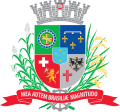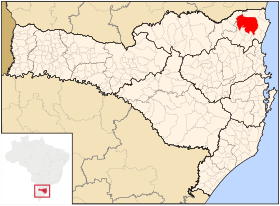Joinville (Brazil)
Coordinates: 26 ° 18 ′ S , 48 ° 51 ′ W
| JOINVILLE | |
|---|---|
 |

|
| Joinville flag | Joinville coat of arms |
| Labelling | |
| founding | March 9, 1851 (colony) March 15, 1866 (city) |
| Area (urban district) | 1,135.05 km² |
| Area (city) | 187.17 km² |
| population | 569,645 inhabitants (2016) |
| administration | |
| Country | Brazil |
| State | Santa Catarina |
| Parish code | 420910 |
| population | |
| Residents | 515,288 inhabitants (2010) |
| Population density | 457 inhabitants / km² |
| growth of population | |
| ethnicities | v. a. Germans, Swiss, Norwegians, before the later European immigration Portuguese and Africans, today's Afro-Brazilians |
| Indigenous people (in the region) | Tupi - Guarani |
| economy | |
| GDP per capita | $ 8,456 p. a. |
| geography | |
| Height above sea (city) | 4 m above sea level d. M. |
| Area (urban district) | 1,135.05 km² |
| Area (city) | 187.17 km² |
| Area (rural settlements) | 544.56 km² |
| climate | |
| Air temperature - annual mean | 21.98 ° C |
| Air temperature - annual mean of daily extremes | 18.95 ° C - 24.89 ° C |
| Air temperature - monthly mean of daily extremes | 13.97 ° C - 28.28 ° C |
| Precipitation amount - mean annual total | 1183.3 mm |
| Precipitation amount - mean monthly totals | 48.8 mm - 239.9 mm |
| Post & traffic | |
| Post Code | 89200-000 |
| Telephone area code | 47 |
| Internet presence | |
| Internet sites | http://www.joinville.sc.gov.br |
Joinville , officially Portuguese Município de Joinville , is the largest city in the southern Brazilian state of Santa Catarina with around 570,000 inhabitants, most of them of German descent . Along with Blumenau and Brusque , the city is one of the centers of German colonization in this state. It is 180 km from the capital, Florianópolis .
Foundation and naming
The city was founded in 1851 as Colônia Dona Francisca founded by Frances of Brazil , the daughter of the Brazilian Emperor I. Peter named. The following year the city was renamed Joinville in honor of her husband François d'Orléans, prince de Joinville . “Swiss immigration was of great importance in the early days of Dona Francisca settlement. The Swiss themselves made up the majority of the colony population. "
City administration
City prefect (prefeito municipal, mayor) has been the re-elected textile entrepreneur Udo Döhler of the Partido do Movimento Democrático Brasileiro (PMDB) since the local elections in 2016 for the term 2017 to 2020 . The legislature rests with the Câmara Municipal Chamber of 33 elected city councils (vereadores).
Population development
According to the 2010 census, the population was 515,288, of which only 13% live in non-urban areas. The area is 1,126.1 km 2 (2015), the population density is 457.6 people per km 2 . The Brazilian statistics institute IBGE estimated the population as of July 1, 2016 at 569,645 inhabitants.
economy
Joinville has the largest industry in the state , more than 600 industries, a large number of banks, and more than 15,000 commercial and service companies. The local automobile manufacturer TAC Motors can also be found in the city.
In addition to the industrial and economic development, the city is now trying to break new ground in tourism and open up the region for it. There is rural tourism, typical festivals, national events and many other attractions throughout the city.
Culture
The dance festival was launched in 1983, today one of the largest in this field in Brazil and even in Latin America . More than 400 dancers meet annually in July. Dance performances can then be found all over Joinville town.
The Fenachopp festival, which was launched in 1988, aims to preserve German traditions in the city. It takes place in October, with lots of music, dancing and beer.
Sports
The city's leading football club is the twelve-time national champions Joinville Esporte Clube .
Approach to Joinville (Photo: Werner Zotz )
Personalities
sons and daughters of the town
- Maurício Gugelmin (* 1963), Formula 1 racing driver
- Márcia Narloch (* 1969), long-distance runner
- Emerson Ramos Borges (born 1980), football player
- Ana Cláudia Michels (* 1981), photo model
- Eliane Martins (* 1986), long jumper
- Alexandr Fier (* 1988), chess grandmaster
- Willian Popp (* 1994), soccer player
- Eduarda Henklein (* 2009), child star on drums
People connected to Joinville
- Christian Matthias Schröder (1778–1860), Hamburg merchant and initiator of the establishment of the first settlement
- Ottokar Dörffel (1818–1906), German lawyer, editor, publisher, mayor of Glauchau and Joinville
Web links
- Joinville - Brazil
- Official website of the city
- Information about Joinville on the South Brazil portal
- citybrazil.com.br (port.)
Individual evidence
- ↑ Dilney Cunha: Paradise in the Mind . A story of Swiss emigration to Brazil in the 19th century. Ed .: Hans-Jürg Fehr. Limmat Verlag, Zurich 2004, ISBN 3-85791-471-8 , p. 9-10 (Original title: Suíços em Joinville. O duplo desterro, 2003, Editora Letradágua, Joinville .).
- ↑ Udo Dohler 15 , website Eleições 2016. Retrieved on May 30, 2017 (Portuguese).
- ↑ IBGE : Cidades @ Santa Catarina: Joinville. Retrieved May 30, 2017 (Portuguese).


